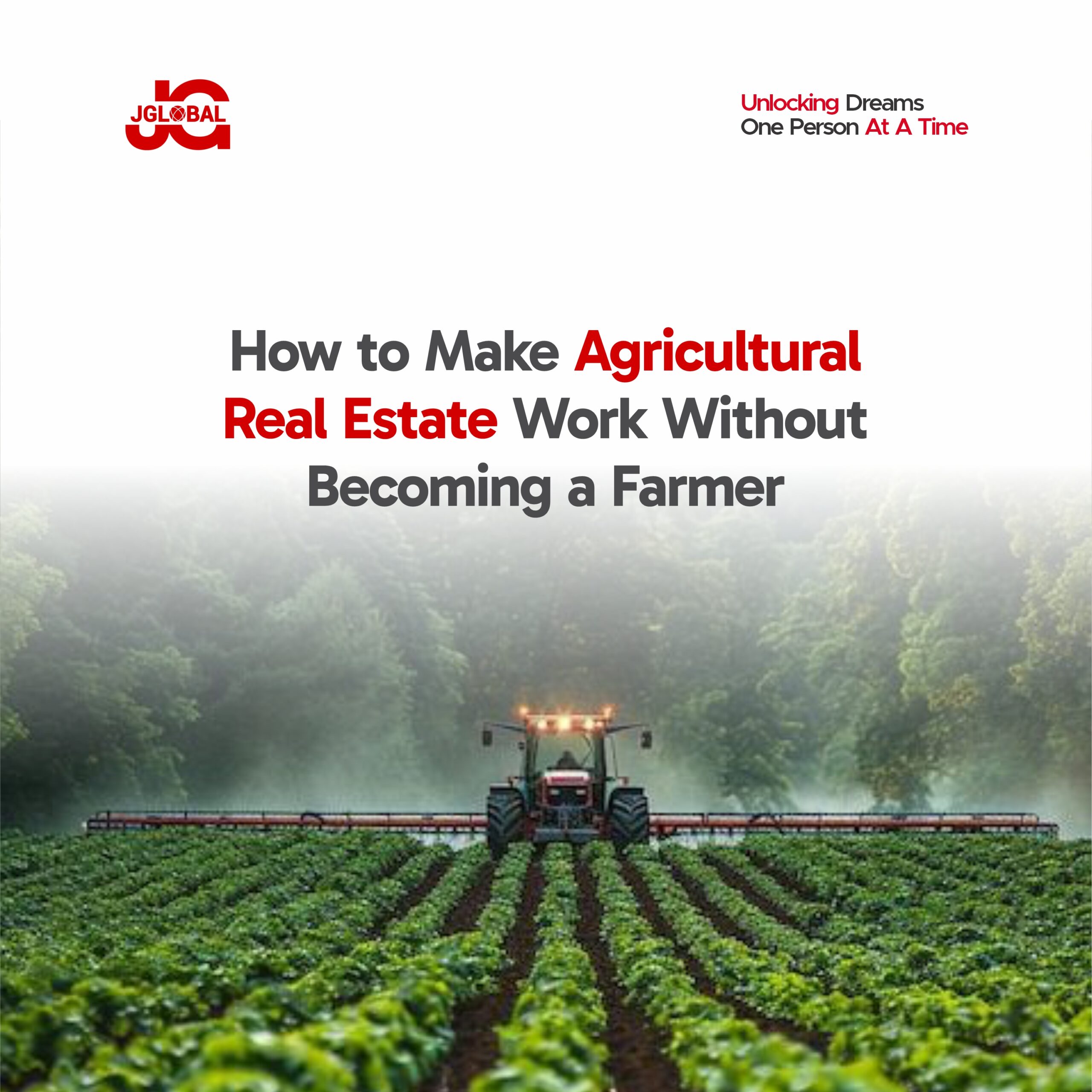How to Make Agricultural Real Estate Work Without Becoming a Farmer

In today’s investment landscape, people are exploring opportunities beyond traditional real estate holdings. A sector gaining significant attention is agricultural real estate investment.
This interest is driven by several compelling factors:
- Rising Food Demand: Agriculture remains a cornerstone of Nigeria’s economy, contributing approximately 24.64% to the nation’s GDP in 2024, underscoring its pivotal role in sustaining the country’s growing population.
- Abundant Agricultural Land: Nigeria boasts approximately 70.8 million hectares of agricultural land, offering vast opportunities for cultivation and investment.
- Inflation Hedge: With Nigeria’s inflation rate reaching 34.8% in December 2024, investors are seeking assets that can serve as a buffer against inflationary pressures.
Despite these advantages, many potential investors hesitate at the mention of “agriculture,” often envisioning the labor-intensive life of a farmer.
However, it’s important to recognize that one doesn’t need to engage in farming activities to benefit from agricultural investments.
This blog will guide you through how to invest in agriculture without farming, explore effective investment models, and demonstrate how you can achieve substantial returns from farmland without hands-on involvement.
- What Is Agricultural Real Estate Investment?
- Why Do People Avoid Agricultural Real Estate Investment?
- How to Invest in Agriculture Without Farming
- 3 Key Benefits of Passive Agricultural Real Estate Investment
- Risks to Know and How to Minimize Them
- What Should I Look for in an Agro-Investment Partner?
- The Best Agricultural Real Estate Investment in Nigeria
What Is Agricultural Real Estate Investment?
Agricultural real estate investment involves buying land primarily used for agricultural purposes like farming, livestock, or plantations with the intent to earn income or allow it to appreciate over time.
It’s not about running the farm yourself; it’s about owning the asset that makes farming possible.
This kind of land typically includes:
- Farmland used for crops
- Plantations (like oil palm or cocoa)
- Agro-estate developments designed for long-term investment returns
Unlike residential or commercial real estate, agricultural land offers a different value proposition.
It’s less volatile, often appreciates steadily, and if structured well can generate passive income through lease agreements or profit-sharing with experienced farm operators.
And if you’re wondering about the best ways to invest in farmland without farming, one major path is partnering with agro-estate companies that manage the land for you while you earn passively.
Why Do People Avoid Agricultural Real Estate Investment?
When most people hear about investing in farmland, their first reaction is, “But I don’t know anything about farming.” Others think, “That’s too much work,” or “I don’t have time to manage a farm.”
And just like that, they walk away from what could be one of the most stable and profitable investments out there.
You can own agricultural land just like you would own a rental property and let someone else do the work.
That’s the beauty of agricultural real estate investment. It separates the physical labor of farming from the financial benefits of land ownership.
The real problem is the mindset. Thinking you have to become a farmer blocks you from seeing the full picture.
When you understand how to invest in agriculture without farming, doors open.
You begin to see the land as an income-generating asset, not a burden. You’re not just buying soil, you’re buying into long-term value, consistent returns, and economic resilience.
How to Invest in Agriculture Without Farming
So, what’s the smartest way to go about it?
How do you invest in Agriculture without becoming a farmer?
Here are 2 ways how to invest in Agricultural Real Estate without farming
- Land leasing: This is one of the best ways to invest in farmland without farming. You buy the land, then lease it to someone who knows the business, like a commercial farmer or agribusiness company. They use the land, make money from it, and pay you rent. Simple. No farming knowledge needed.
- Work with companies that specialize in agricultural real estate investment: These are trusted firms that already own or manage large agro-estate projects. When you invest through them, your money goes into farmland that’s already structured to generate returns. They handle everything from crop management to harvesting and selling while you earn from either a fixed lease income or a share of the profits.
Some of these companies even offer what’s called “fractional ownership.” That means you can co-own a plot of farmland with others and still enjoy returns based on your share. This lowers your entry cost while keeping your investment passive.
In short, how to invest in agriculture without farming isn’t a mystery. It’s about knowing where to put your money so it works for you without needing to work the land yourself.
3 Key Benefits of Passive Agricultural Real Estate Investment
When you understand how to invest in agriculture without farming, the potential becomes clearer. You’re not just buying land, you’re securing a long-term asset that can quietly grow your wealth while you focus on other things.
One of the biggest benefits is long-term appreciation. Agricultural land tends to increase in value over time, especially as urban expansion and food demand rise.
Then there’s the appeal of passive income. When you lease your land to a commercial farmer or agribusiness, you can earn:
- Fixed lease payments (like rent for your land)
- Produce-sharing returns (a percentage of the profits from the farm)
Both models allow you to earn consistently without stepping onto the land.
Farmland also acts as a strong inflation hedge. As the cost of living goes up, so does the value of food and by extension, farmland. This makes agricultural real estate investment a smart way to protect your money while diversifying your portfolio beyond property rentals.
Risks to Know and How to Minimize Them
Every investment has risks even passive ones. But with farmland, most of the risks can be managed if you know what to look for.
- Location and land verification: Not all farmland is investment-worthy. Some may lack infrastructure or proper title documentation. Before you invest, check that the land is legally registered, accessible, and positioned in an area with real agricultural potential.
- Poor farm management: If the farming is mismanaged, it affects your returns. That’s why choosing the right partners matters.
Read more on Land documentation and survey
Here are 5 essential checks before purchasing a property in Nigeria
Here’s how to minimize these risks:
- Work only with reputable agricultural real estate companies or cooperatives. Look for those with experience, transparency, and clear legal structures.
- Review contracts carefully including how returns are calculated, when payouts happen, and who’s managing the farm.
- Do your due diligence: Visit the site (if possible), speak with investors, and verify any claims the company makes.
Knowing how to invest in agriculture without farming includes knowing how to ask the right questions, and who to trust. Passive doesn’t mean careless. The more informed you are, the better your chances of long-term success.
Examples of Passive Agricultural Real Estate Investment Models
Today, you don’t need to buy hundreds of acres to participate. Thanks to digital platforms and structured models, you can invest in farmland the same way you might invest in stocks or mutual funds without ever getting your hands dirty.
One popular trend is farmland crowdfunding. This model allows multiple investors to pool funds and co-own a large piece of land. The land is then leased to farmers or managed by professionals, and returns are shared based on your contribution. It’s one of the best ways to invest in farmland without farming because it lowers your entry cost and spreads risk.
Another common model is agro-estate investment units. These are curated plots within a managed farm estate. You invest in a specific unit, and a company handles the farming activities while you receive income either through lease agreements or profit-sharing.
For example, take Tunde, a civil engineer living in Abuja. He owns two plots in an oil plantation located in a different state. He’s never visited the site, doesn’t know how to plant a palm tree, and yet earns quarterly returns through a lease agreement with an agribusiness that manages the land. This is what investing in agriculture without farming looks like in real life.
What to Look for in an Agro Investment Partner
Now that you’re exploring how to invest in agriculture without farming, it’s critical to choose the right partner. Your returns depend heavily on who’s managing the land, how the farm is run, and whether your investment is backed by real legal and agricultural value.
Here’s what to look for before putting your money in:
- A proven track record: How long have they been in business? Do they have successful projects and satisfied investors?
- A clear ROI model: What are the expected returns, and when do payouts happen? Is it fixed rent or performance-based?
- Verified land ownership and documentation: Ensure the farmland has proper title documents and that you can confirm your ownership or stake.
- Land development status: Are the lands already cleared and cultivated, or is the project still in early stages?
The best agro-investment partners will also be transparent, responsive to your questions, and willing to walk you through the process. Passive investing doesn’t mean blind investing. When it comes to agricultural real estate investment, clarity and credibility are everything.
The Best Agricultural Real Estate Investment in Nigeria
The only way money multiplies is through investment but most people only know how to earn money through jobs, businesses, or side hustles. What many don’t realize is that agricultural real estate investment is one of the smartest, most sustainable ways to grow wealth especially when you find the right project.
Palm City was created to help people invest in agriculture without farming, without stress, and without guesswork.
Backed by one of the most in-demand agricultural commodities palm oil, Palm City allows you to own farmland and earn from it without doing any of the farming yourself.
Palm oil is used in food, cosmetics, and even biofuels, and its global demand keeps rising. That makes it more than just another crop, it’s a system that generates massive, renewable income.
And Palm City is built to tap into this system, offering you:
- Structured passive income models, including lease options, profit-sharing, or long-term land appreciation
- Projections of up to ₦3.4M to ₦18M annually, depending on land size and investment structure
- Fully managed farmland, so you don’t need any agricultural experience
- Secure title documentation, giving you verified ownership
- A model ideal for busy professionals, diaspora Nigerians, and retirees who want to multiply money, not manage a farm
This is one of the best ways to invest in farmland without farming. You benefit from the strength of Nigeria’s top-performing sector: agriculture contributed 29.44% to the nation’s GDP in 2024 alone while letting seasoned experts manage the day-to-day operations.

Ready to take the next step?
Book a consultation with Jglobalproperties to learn how Palm City can help you build long-term wealth through agricultural real estate—without ever picking up a hoe.
Conclusion
You don’t need to understand crop rotation or irrigation systems to benefit from farmland. You just need to understand that land, especially agricultural land, will always be in demand.
Learning how to invest in agriculture without farming opens the door to one of the most overlooked but powerful wealth-building tools out there. With the right approach and the right partners you can earn steady income, build long-term assets, and diversify your portfolio, all without ever lifting a hoe.
So if you’ve been avoiding agricultural real estate investment because it seemed too complicated or hands-on, now you know better. The opportunities are real, the structures are already in place, and models like Palm City are making it even easier.



